Understanding the TOK essay rubric
TOK Home > Free TOK notes > TOK essay guidance > Understanding the TOK essay rubric

After understanding the of the basics of the essay, your next step is to grasp how it is evaluated and marked, which is outlined in the ‘assessment instrument’. Your TOK teacher will give you a copy of this, or you can find it online in the 2022 TOK Guide.
The overall assessment objective of the TOK essay is to answer the prescribed essay title in a clear, coherent, and critical way. In order to do this, the assessment ‘instrument’ looks for five different skills.

STEP 1: Understand the TOK essay rubric
1. making links to tok.
The discussion within your TOK essay should be linked very effectively to the areas of knowledge . Most, TOK essays expect you to discuss two AOKs, which will provide you with the context to explore and answer the prescribed title you’ve chosen.
2. Understanding perspectives
Your TOK essay should show a clear awareness of different points of view, and should offer an evaluation of them. This means considering how different perspective might approach the question in different ways.
3. Offering an effective argument
The arguments within your TOK essay are clear and coherent, and are supported by strong examples.
This means expressing your opinions clearly, and supporting them with original and meaningful real-life situations.
4. Keeping discussions relevant
Your essay’s discussions should offer a ‘sustained focus’ on the title. This means that you should be able to pick out any section of your essay, and be able to identify what question it is answering.
5. Considering implications
Your essay needs to not just present and evaluate arguments, it also needs to say why these arguments are significant, and what their implications are.
After you have grasped the rubric strands, you are ready to move on to choosing your prescribed title from the choice of six that are published in March or November – which we provide guidance on here .
Creating a TOK essay: our four-step guide
Click on the buttons below to take you to the four steps of creating a great TOK essay. Don’t forget that we have plenty of videos on this and other aspects of the course, and members of the site have access to a huge amount of other resources to help you master the course and assessment tasks.

How to write a TOK essay: webinar
This 80-minute webinar video and presentation gives you a clear, engaging, step-by-step guide to the task, helping you to understand the assessment rubric, choose the right PT, and produce an essay that hits all the assessment targets.
The video is supported by a presentation, and a Q&A debrief answering some of the most common questions asked about writing a TOK essay. Purchase your ticket here .
More support for the TOK essay
Make sure that your TOK teacher has given you access to all the documents and online material that support the essay. These include the TOK Subject Guide, the TOK essay rubric, and exemplar TOK essays (found in ‘MyIB’, which is accessible to teachers). Make sure you go through our other pages on writing the TOK essay. You’ll find help on understanding what the is looking for, that works for you, what each of the should focus on, how to an effective TOK essay, and how to fill in your . If your school is a member of theoryofknowledge.net, we have designed a series of lessons on the essay, with two formative assessment tasks. These will familiarize you with the essay rubric, knowledge questions, real-life situations, how to deal with perspectives and implications, and structuring an essay. If you are signed into the site, you can access these lessons here . You can also find out our thoughts on the TOK essay (and the TOK exhibition) in several webinars that we have delivered. The main one is the TOK Assessment 2022 webinar, but we also consider this form of assessment in our free webinars on the 2022 course. You can see these webinars on this page of the site.

Subscribe to the free TOK newsletter!
Subscribe to our free newsletter, and collect fantastic examples that will help you to understand the key ideas of TOK, support your essay and exhibition discussions, and help you to become an authentic critical thinker .
You’ll encounter some of the most important thinkers from the past and the present, go beyond the headlines of contemporary events and issues around the globe, and see how TOK concepts manifest in the real-world. Subscribe HERE !

IB TOK Essay examples
Type a search phrase to find the most relevant TOK Essay examples for you
Not sure what to search for? You can always look through our example Internal Assessments below for inspiration.

All TOK Essay Examples
Filter exemplars, for artists and natural scientists, which is more important: what can be explained or what cannot be explained discuss with reference to the arts and the natural sciences., does it matter if our acquisition of knowledge happens in "bubbles" where some information and voices are excluded discuss with reference to two areas of knowledge., want to get full marks for your tok essay allow us to review it for you 🎯, is replicability necessary in the production of knowledge discuss with reference to two areas of knowledge., are visual representations always helpful in the communication of knowledge discuss with reference to the human sciences and mathematics., fast track your coursework with mark schemes moderated by ib examiners. upgrade now 🚀, to what extent is the knowledge we produce determined by the methodologies we use discuss with reference to history and one area of knowledge., tok essay: 5. “how can we distinguish between good and bad interpretations discuss with reference to the arts and one other area of knowledge”, 如果我们是在排除某些信息和声音的“信息同温层”里获取知识,这有关系吗请参考两个知识领域展开你的应答。, does it matter if our knowledge acquisition happens in "bubbles" where some information and voices are excluded discuss with reference to two areas of knowledge., is replicability necessary in the production of knowledge discuss with reference to two areas of knowledge, do you agree that it is “astonishing that so little knowledge can give us so much power” (bertrand russell) discuss with reference to the natural sciences and one other area of knowledge., does it matter if our acquisition of knowledge happens in “bubbles” where some information and voices are excluded discuss with reference to two areas of knowledge., to what extent is the knowledge weproduce determined by the methodologieswe use, for artists and natural scientists, which is more important: what can be explained or what cannot be explained discuss with reference to the arts and natural science., êtes-vous d'accord qu'il est "étonnant que si peu de connaissance puissent nous donner autant de pouvoir" (bertrand russell) - discutez cette question en faisant référence aux sciences naturelles et à un autre domaine de la connaissance, est-il important que notre acquisition des connaissances se fasse dans des « bulles » où certaines informations et certaines voix sont exclues discutez cette question en faisant référence à deux domaines de la connaissance., to what extent is the knowledge we produce determined by the methodologies we use discuss with reference to history and one other area of knowledge., is replicability necessary in the production of knowledge discuss with reference to two area of knowledge, are visual representations always helpful in communicating knowledge discuss with reference to the human sciences and mathematics., are visual representations always useful in communication of knowledge discuss with reference to the human sciences and mathematics., for artists and natural scientists which is more important: what can be explained or what cannot be explained, is replication necessary in the production of knowledge discuss with reference to two aoks., do you agree that it is "astonishing that so little knowledge can give us so much power" (bertrand russell) discuss with reference to the natural sciences and one other area of knowledge., is replicability necessary in the production of knowledge.
What are your chances of acceptance?
Calculate for all schools, your chance of acceptance.
Your chancing factors
Extracurriculars.
Guide to the TOK Essay
What’s covered:.
- What is Theory of Knowledge (TOK)?
- What is the Theory of Knowledge Essay?
How is the Theory of Knowledge Essay Scored?
How to structure your theory of knowledge essay.
The International Baccalaureate Diploma Programme (IB/IBDP) is a rigorous and rewarding internationally based educational program that offers courses in numerous studies, from humanities to chemistry. Students take part in a two-year curriculum that includes external examinations, internal assessments, research papers and community service hours. Essentially, students will have to do a bit of everything, especially with IB’s core, which is CAS, TOK, and the extended essay (EE). Understanding how TOK, IB’s flagship class, is assessed with its essay is important to success in the course overall.
What is Theory Of Knowledge (TOK)?
Theory of Knowledge is IB’s way of introducing a more intuitive way of thinking into classrooms. TOK is at its surface as simple as it sounds: you essentially learn the “what” and “why” of how we learn and understand knowledge. In order to assess students of their skills in TOK, IB uses an essay and a presentation. The essay makes up 67% of your total TOK score, making it the most important task to focus on for getting a high score.
What is the Theory Of Knowledge Essay?
The TOK essay is a 1600 word essay written about topics usually given to students from their teachers from a list of numerous options. It is an essay that promotes arguments and counterarguments for the topic at hand. Understanding your ways of knowing (WOKs) and areas of knowledge (AOKs) is extremely crucial before you even start choosing a topic to write on, as your essay will revolve around and structure itself based on these two concepts. Being able to demonstrate higher-level thinking and using examples to solidify the points you make in your essay is also important. Additionally, you’ll need to reference every source of information that you use, since that is something examiners look for as well.
As said earlier, 67% of your grade is from the essay, and your overall TOK score receives a letter grade using a calculated score out of thirty. Your essay score and presentation score are each out of ten. The grades for your TOK presentation and essay are determined by sending material to the board of IB, from which they designate a grader/examiner to read your essay and grade based on a rubric that determines the level of knowledge you exhibit in your writing.
The following formula should better explain how to find your TOK grade.
(presentation score) + (essay score * 2) = overall score out of 30
The grade boundaries out of 30 that determine your letter grade can vary each year so checking in with your school for the most recent ones is the best course of action, but an example set would be like this:
Once you have a letter grade for IB, your extended essay, which is another part of the core, is also included into a larger grading schema to calculate your core score, which is three additional points required to complete and earn the diploma. The following table details this grade further:
Doing well in the core is important to passing IB and getting three points out of the total 45 attainable points.
There’s a trick that most IB students use in writing the TOK essay, and it boils down to understanding four key components of learning:
- Content : Understanding knowledge issues
- Clarity : Structuring your essay in a legible and clear/easy to read manner
- Creativity : Using your personal ways of thinking and applications of knowledge specific to your understanding of the knowledge issue
- Critical Thinking : Using a counter argument for every argument you have to analyze your own claims constantly
Dividing your actual essay into three main chunks helps, starting with an introduction. Your introduction should be where you state your knowledge question, the central point of your essay, and you should make use of jargon specific to the concept. As the basis of your essay, the introduction should be where you form claims and counterclaims that either support or challenge the knowledge question through heavy analysis and evaluation.
The body of the essay follows the introduction, and it is where most of the conceptual analysis of your knowledge question takes place. Every argument and its counterargument should have a dedicated paragraph of its own, and make sure to not jump back and forth too much throughout the essay. to avoid creating messy transitions for the reader and potentially harming your score. Understanding the essay from the reader’s point of view is important, as it will help you better understand how to structure the body of your essay.
A conclusion in the TOK essay is mainly for finding closure among the numerous arguments that have been taking place thus far in the essay. Make sure to summarize but not repeat previous information entirely to refresh the reader. A conclusion should essentially loop back to the beginning of the essay, the knowledge question. The knowledge question’s answer should be the conclusion and the stopping point of the essay, and by now the answer you provide should be backed by paragraphs of supporting claims and counterclaims. If done right, concluding the essay can be how you earn most of your points.
Start Early
Starting early is an obvious and effective advantage to students. Aside from TOK, let alone the presentation, IB has substantial work that requires focus and allocated time dedicated to it, such as external examinations and the extended essay. These tasks are equally as important as the TOK essay, so starting your outlining, drafting or even just planning early will set you up for success.
Send Your Drafts to Your Teacher
Your TOK teacher is a great resource for drafting essays and making edits to perfect your final product. Making use of time outside of the classroom to catch your teacher for a quick review of your essay could be a bigger advantage than you realize. Making use of an outside perspective is essential to forming a great essay.
While your final IB grade isn’t as important as you’d think regarding college admissions, understanding how to pass TOK and using the lifelong practices you’ll learn in the class is even more important. TOK creates students who think outside conventional methods, making them excellent candidates in the eyes of college admissions offices. Taking TOK and showing proof of understanding it as well as capability of academic rigor is what colleges are looking for. For more information on how your chances of college admissions might look, use CollegeVine’s admissions calculator !
Related CollegeVine Blog Posts


Choose Your Test
Sat / act prep online guides and tips, the complete ib extended essay guide: examples, topics, and ideas.
International Baccalaureate (IB)

IB students around the globe fear writing the Extended Essay, but it doesn't have to be a source of stress! In this article, I'll get you excited about writing your Extended Essay and provide you with the resources you need to get an A on it.
If you're reading this article, I'm going to assume you're an IB student getting ready to write your Extended Essay. If you're looking at this as a potential future IB student, I recommend reading our introductory IB articles first, including our guide to what the IB program is and our full coverage of the IB curriculum .
IB Extended Essay: Why Should You Trust My Advice?
I myself am a recipient of an IB Diploma, and I happened to receive an A on my IB Extended Essay. Don't believe me? The proof is in the IBO pudding:

If you're confused by what this report means, EE is short for Extended Essay , and English A1 is the subject that my Extended Essay topic coordinated with. In layman's terms, my IB Diploma was graded in May 2010, I wrote my Extended Essay in the English A1 category, and I received an A grade on it.
What Is the Extended Essay in the IB Diploma Programme?
The IB Extended Essay, or EE , is a mini-thesis you write under the supervision of an IB advisor (an IB teacher at your school), which counts toward your IB Diploma (learn more about the major IB Diploma requirements in our guide) . I will explain exactly how the EE affects your Diploma later in this article.
For the Extended Essay, you will choose a research question as a topic, conduct the research independently, then write an essay on your findings . The essay itself is a long one—although there's a cap of 4,000 words, most successful essays get very close to this limit.
Keep in mind that the IB requires this essay to be a "formal piece of academic writing," meaning you'll have to do outside research and cite additional sources.
The IB Extended Essay must include the following:
- A title page
- Contents page
- Introduction
- Body of the essay
- References and bibliography
Additionally, your research topic must fall into one of the six approved DP categories , or IB subject groups, which are as follows:
- Group 1: Studies in Language and Literature
- Group 2: Language Acquisition
- Group 3: Individuals and Societies
- Group 4: Sciences
- Group 5: Mathematics
- Group 6: The Arts
Once you figure out your category and have identified a potential research topic, it's time to pick your advisor, who is normally an IB teacher at your school (though you can also find one online ). This person will help direct your research, and they'll conduct the reflection sessions you'll have to do as part of your Extended Essay.
As of 2018, the IB requires a "reflection process" as part of your EE supervision process. To fulfill this requirement, you have to meet at least three times with your supervisor in what the IB calls "reflection sessions." These meetings are not only mandatory but are also part of the formal assessment of the EE and your research methods.
According to the IB, the purpose of these meetings is to "provide an opportunity for students to reflect on their engagement with the research process." Basically, these meetings give your supervisor the opportunity to offer feedback, push you to think differently, and encourage you to evaluate your research process.
The final reflection session is called the viva voce, and it's a short 10- to 15-minute interview between you and your advisor. This happens at the very end of the EE process, and it's designed to help your advisor write their report, which factors into your EE grade.
Here are the topics covered in your viva voce :
- A check on plagiarism and malpractice
- Your reflection on your project's successes and difficulties
- Your reflection on what you've learned during the EE process
Your completed Extended Essay, along with your supervisor's report, will then be sent to the IB to be graded. We'll cover the assessment criteria in just a moment.

We'll help you learn how to have those "lightbulb" moments...even on test day!
What Should You Write About in Your IB Extended Essay?
You can technically write about anything, so long as it falls within one of the approved categories listed above.
It's best to choose a topic that matches one of the IB courses , (such as Theatre, Film, Spanish, French, Math, Biology, etc.), which shouldn't be difficult because there are so many class subjects.
Here is a range of sample topics with the attached extended essay:
- Biology: The Effect of Age and Gender on the Photoreceptor Cells in the Human Retina
- Chemistry: How Does Reflux Time Affect the Yield and Purity of Ethyl Aminobenzoate (Benzocaine), and How Effective is Recrystallisation as a Purification Technique for This Compound?
- English: An Exploration of Jane Austen's Use of the Outdoors in Emma
- Geography: The Effect of Location on the Educational Attainment of Indigenous Secondary Students in Queensland, Australia
- Math: Alhazen's Billiard Problem
- Visual Arts: Can Luc Tuymans Be Classified as a Political Painter?
You can see from how varied the topics are that you have a lot of freedom when it comes to picking a topic . So how do you pick when the options are limitless?

How to Write a Stellar IB Extended Essay: 6 Essential Tips
Below are six key tips to keep in mind as you work on your Extended Essay for the IB DP. Follow these and you're sure to get an A!
#1: Write About Something You Enjoy
You can't expect to write a compelling essay if you're not a fan of the topic on which you're writing. For example, I just love British theatre and ended up writing my Extended Essay on a revolution in post-WWII British theatre. (Yes, I'm definitely a #TheatreNerd.)
I really encourage anyone who pursues an IB Diploma to take the Extended Essay seriously. I was fortunate enough to receive a full-tuition merit scholarship to USC's School of Dramatic Arts program. In my interview for the scholarship, I spoke passionately about my Extended Essay; thus, I genuinely think my Extended Essay helped me get my scholarship.
But how do you find a topic you're passionate about? Start by thinking about which classes you enjoy the most and why . Do you like math classes because you like to solve problems? Or do you enjoy English because you like to analyze literary texts?
Keep in mind that there's no right or wrong answer when it comes to choosing your Extended Essay topic. You're not more likely to get high marks because you're writing about science, just like you're not doomed to failure because you've chosen to tackle the social sciences. The quality of what you produce—not the field you choose to research within—will determine your grade.
Once you've figured out your category, you should brainstorm more specific topics by putting pen to paper . What was your favorite chapter you learned in that class? Was it astrophysics or mechanics? What did you like about that specific chapter? Is there something you want to learn more about? I recommend spending a few hours on this type of brainstorming.
One last note: if you're truly stumped on what to research, pick a topic that will help you in your future major or career . That way you can use your Extended Essay as a talking point in your college essays (and it will prepare you for your studies to come too!).
#2: Select a Topic That Is Neither Too Broad nor Too Narrow
There's a fine line between broad and narrow. You need to write about something specific, but not so specific that you can't write 4,000 words on it.
You can't write about WWII because that would be a book's worth of material. You also don't want to write about what type of soup prisoners of war received behind enemy lines, because you probably won’t be able to come up with 4,000 words of material about it. However, you could possibly write about how the conditions in German POW camps—and the rations provided—were directly affected by the Nazis' successes and failures on the front, including the use of captured factories and prison labor in Eastern Europe to increase production. WWII military history might be a little overdone, but you get my point.
If you're really stuck trying to pinpoint a not-too-broad-or-too-narrow topic, I suggest trying to brainstorm a topic that uses a comparison. Once you begin looking through the list of sample essays below, you'll notice that many use comparisons to formulate their main arguments.
I also used a comparison in my EE, contrasting Harold Pinter's Party Time with John Osborne's Look Back in Anger in order to show a transition in British theatre. Topics with comparisons of two to three plays, books, and so on tend to be the sweet spot. You can analyze each item and then compare them with one another after doing some in-depth analysis of each individually. The ways these items compare and contrast will end up forming the thesis of your essay!
When choosing a comparative topic, the key is that the comparison should be significant. I compared two plays to illustrate the transition in British theatre, but you could compare the ways different regional dialects affect people's job prospects or how different temperatures may or may not affect the mating patterns of lightning bugs. The point here is that comparisons not only help you limit your topic, but they also help you build your argument.
Comparisons are not the only way to get a grade-A EE, though. If after brainstorming, you pick a non-comparison-based topic and are still unsure whether your topic is too broad or narrow, spend about 30 minutes doing some basic research and see how much material is out there.
If there are more than 1,000 books, articles, or documentaries out there on that exact topic, it may be too broad. But if there are only two books that have any connection to your topic, it may be too narrow. If you're still unsure, ask your advisor—it's what they're there for! Speaking of advisors...

Don't get stuck with a narrow topic!
#3: Choose an Advisor Who Is Familiar With Your Topic
If you're not certain of who you would like to be your advisor, create a list of your top three choices. Next, write down the pros and cons of each possibility (I know this sounds tedious, but it really helps!).
For example, Mr. Green is my favorite teacher and we get along really well, but he teaches English. For my EE, I want to conduct an experiment that compares the efficiency of American electric cars with foreign electric cars.
I had Ms. White a year ago. She teaches physics and enjoyed having me in her class. Unlike Mr. Green, Ms. White could help me design my experiment.
Based on my topic and what I need from my advisor, Ms. White would be a better fit for me than would Mr. Green (even though I like him a lot).
The moral of my story is this: do not just ask your favorite teacher to be your advisor . They might be a hindrance to you if they teach another subject. For example, I would not recommend asking your biology teacher to guide you in writing an English literature-based EE.
There can, of course, be exceptions to this rule. If you have a teacher who's passionate and knowledgeable about your topic (as my English teacher was about my theatre topic), you could ask that instructor. Consider all your options before you do this. There was no theatre teacher at my high school, so I couldn't find a theatre-specific advisor, but I chose the next best thing.
Before you approach a teacher to serve as your advisor, check with your high school to see what requirements they have for this process. Some IB high schools require your IB Extended Essay advisor to sign an Agreement Form , for instance.
Make sure that you ask your IB coordinator whether there is any required paperwork to fill out. If your school needs a specific form signed, bring it with you when you ask your teacher to be your EE advisor.
#4: Pick an Advisor Who Will Push You to Be Your Best
Some teachers might just take on students because they have to and aren't very passionate about reading drafts, only giving you minimal feedback. Choose a teacher who will take the time to read several drafts of your essay and give you extensive notes. I would not have gotten my A without being pushed to make my Extended Essay draft better.
Ask a teacher that you have experience with through class or an extracurricular activity. Do not ask a teacher that you have absolutely no connection to. If a teacher already knows you, that means they already know your strengths and weaknesses, so they know what to look for, where you need to improve, and how to encourage your best work.
Also, don't forget that your supervisor's assessment is part of your overall EE score . If you're meeting with someone who pushes you to do better—and you actually take their advice—they'll have more impressive things to say about you than a supervisor who doesn't know you well and isn't heavily involved in your research process.
Be aware that the IB only allows advisors to make suggestions and give constructive criticism. Your teacher cannot actually help you write your EE. The IB recommends that the supervisor spends approximately two to three hours in total with the candidate discussing the EE.
#5: Make Sure Your Essay Has a Clear Structure and Flow
The IB likes structure. Your EE needs a clear introduction (which should be one to two double-spaced pages), research question/focus (i.e., what you're investigating), a body, and a conclusion (about one double-spaced page). An essay with unclear organization will be graded poorly.
The body of your EE should make up the bulk of the essay. It should be about eight to 18 pages long (again, depending on your topic). Your body can be split into multiple parts. For example, if you were doing a comparison, you might have one third of your body as Novel A Analysis, another third as Novel B Analysis, and the final third as your comparison of Novels A and B.
If you're conducting an experiment or analyzing data, such as in this EE , your EE body should have a clear structure that aligns with the scientific method ; you should state the research question, discuss your method, present the data, analyze the data, explain any uncertainties, and draw a conclusion and/or evaluate the success of the experiment.
#6: Start Writing Sooner Rather Than Later!
You will not be able to crank out a 4,000-word essay in just a week and get an A on it. You'll be reading many, many articles (and, depending on your topic, possibly books and plays as well!). As such, it's imperative that you start your research as soon as possible.
Each school has a slightly different deadline for the Extended Essay. Some schools want them as soon as November of your senior year; others will take them as late as February. Your school will tell you what your deadline is. If they haven't mentioned it by February of your junior year, ask your IB coordinator about it.
Some high schools will provide you with a timeline of when you need to come up with a topic, when you need to meet with your advisor, and when certain drafts are due. Not all schools do this. Ask your IB coordinator if you are unsure whether you are on a specific timeline.
Below is my recommended EE timeline. While it's earlier than most schools, it'll save you a ton of heartache (trust me, I remember how hard this process was!):
- January/February of Junior Year: Come up with your final research topic (or at least your top three options).
- February of Junior Year: Approach a teacher about being your EE advisor. If they decline, keep asking others until you find one. See my notes above on how to pick an EE advisor.
- April/May of Junior Year: Submit an outline of your EE and a bibliography of potential research sources (I recommend at least seven to 10) to your EE advisor. Meet with your EE advisor to discuss your outline.
- Summer Between Junior and Senior Year: Complete your first full draft over the summer between your junior and senior year. I know, I know—no one wants to work during the summer, but trust me—this will save you so much stress come fall when you are busy with college applications and other internal assessments for your IB classes. You will want to have this first full draft done because you will want to complete a couple of draft cycles as you likely won't be able to get everything you want to say into 4,000 articulate words on the first attempt. Try to get this first draft into the best possible shape so you don't have to work on too many revisions during the school year on top of your homework, college applications, and extracurriculars.
- August/September of Senior Year: Turn in your first draft of your EE to your advisor and receive feedback. Work on incorporating their feedback into your essay. If they have a lot of suggestions for improvement, ask if they will read one more draft before the final draft.
- September/October of Senior Year: Submit the second draft of your EE to your advisor (if necessary) and look at their feedback. Work on creating the best possible final draft.
- November-February of Senior Year: Schedule your viva voce. Submit two copies of your final draft to your school to be sent off to the IB. You likely will not get your grade until after you graduate.
Remember that in the middle of these milestones, you'll need to schedule two other reflection sessions with your advisor . (Your teachers will actually take notes on these sessions on a form like this one , which then gets submitted to the IB.)
I recommend doing them when you get feedback on your drafts, but these meetings will ultimately be up to your supervisor. Just don't forget to do them!

The early bird DOES get the worm!
How Is the IB Extended Essay Graded?
Extended Essays are graded by examiners appointed by the IB on a scale of 0 to 34 . You'll be graded on five criteria, each with its own set of points. You can learn more about how EE scoring works by reading the IB guide to extended essays .
- Criterion A: Focus and Method (6 points maximum)
- Criterion B: Knowledge and Understanding (6 points maximum)
- Criterion C: Critical Thinking (12 points maximum)
- Criterion D: Presentation (4 points maximum)
- Criterion E: Engagement (6 points maximum)
How well you do on each of these criteria will determine the final letter grade you get for your EE. You must earn at least a D to be eligible to receive your IB Diploma.
Although each criterion has a point value, the IB explicitly states that graders are not converting point totals into grades; instead, they're using qualitative grade descriptors to determine the final grade of your Extended Essay . Grade descriptors are on pages 102-103 of this document .
Here's a rough estimate of how these different point values translate to letter grades based on previous scoring methods for the EE. This is just an estimate —you should read and understand the grade descriptors so you know exactly what the scorers are looking for.
Here is the breakdown of EE scores (from the May 2021 bulletin):
How Does the Extended Essay Grade Affect Your IB Diploma?
The Extended Essay grade is combined with your TOK (Theory of Knowledge) grade to determine how many points you get toward your IB Diploma.
To learn about Theory of Knowledge or how many points you need to receive an IB Diploma, read our complete guide to the IB program and our guide to the IB Diploma requirements .
This diagram shows how the two scores are combined to determine how many points you receive for your IB diploma (3 being the most, 0 being the least). In order to get your IB Diploma, you have to earn 24 points across both categories (the TOK and EE). The highest score anyone can earn is 45 points.

Let's say you get an A on your EE and a B on TOK. You will get 3 points toward your Diploma. As of 2014, a student who scores an E on either the extended essay or TOK essay will not be eligible to receive an IB Diploma .
Prior to the class of 2010, a Diploma candidate could receive a failing grade in either the Extended Essay or Theory of Knowledge and still be awarded a Diploma, but this is no longer true.
Figuring out how you're assessed can be a little tricky. Luckily, the IB breaks everything down here in this document . (The assessment information begins on page 219.)
40+ Sample Extended Essays for the IB Diploma Programme
In case you want a little more guidance on how to get an A on your EE, here are over 40 excellent (grade A) sample extended essays for your reading pleasure. Essays are grouped by IB subject.
- Business Management 1
- Chemistry 1
- Chemistry 2
- Chemistry 3
- Chemistry 4
- Chemistry 5
- Chemistry 6
- Chemistry 7
- Computer Science 1
- Economics 1
- Design Technology 1
- Design Technology 2
- Environmental Systems and Societies 1
- Geography 1
- Geography 2
- Geography 3
- Geography 4
- Geography 5
- Geography 6
- Literature and Performance 1
- Mathematics 1
- Mathematics 2
- Mathematics 3
- Mathematics 4
- Mathematics 5
- Philosophy 1
- Philosophy 2
- Philosophy 3
- Philosophy 4
- Philosophy 5
- Psychology 1
- Psychology 2
- Psychology 3
- Psychology 4
- Psychology 5
- Social and Cultural Anthropology 1
- Social and Cultural Anthropology 2
- Social and Cultural Anthropology 3
- Sports, Exercise and Health Science 1
- Sports, Exercise and Health Science 2
- Visual Arts 1
- Visual Arts 2
- Visual Arts 3
- Visual Arts 4
- Visual Arts 5
- World Religion 1
- World Religion 2
- World Religion 3

What's Next?
Trying to figure out what extracurriculars you should do? Learn more about participating in the Science Olympiad , starting a club , doing volunteer work , and joining Student Government .
Studying for the SAT? Check out our expert study guide to the SAT . Taking the SAT in a month or so? Learn how to cram effectively for this important test .
Not sure where you want to go to college? Read our guide to finding your target school . Also, determine your target SAT score or target ACT score .
Want to improve your SAT score by 160 points or your ACT score by 4 points? We've written a guide for each test about the top 5 strategies you must be using to have a shot at improving your score. Download it for free now:

As an SAT/ACT tutor, Dora has guided many students to test prep success. She loves watching students succeed and is committed to helping you get there. Dora received a full-tuition merit based scholarship to University of Southern California. She graduated magna cum laude and scored in the 99th percentile on the ACT. She is also passionate about acting, writing, and photography.
Student and Parent Forum
Our new student and parent forum, at ExpertHub.PrepScholar.com , allow you to interact with your peers and the PrepScholar staff. See how other students and parents are navigating high school, college, and the college admissions process. Ask questions; get answers.

Ask a Question Below
Have any questions about this article or other topics? Ask below and we'll reply!

Improve With Our Famous Guides
- For All Students
The 5 Strategies You Must Be Using to Improve 160+ SAT Points
How to Get a Perfect 1600, by a Perfect Scorer
Series: How to Get 800 on Each SAT Section:
Score 800 on SAT Math
Score 800 on SAT Reading
Score 800 on SAT Writing
Series: How to Get to 600 on Each SAT Section:
Score 600 on SAT Math
Score 600 on SAT Reading
Score 600 on SAT Writing
Free Complete Official SAT Practice Tests
What SAT Target Score Should You Be Aiming For?
15 Strategies to Improve Your SAT Essay
The 5 Strategies You Must Be Using to Improve 4+ ACT Points
How to Get a Perfect 36 ACT, by a Perfect Scorer
Series: How to Get 36 on Each ACT Section:
36 on ACT English
36 on ACT Math
36 on ACT Reading
36 on ACT Science
Series: How to Get to 24 on Each ACT Section:
24 on ACT English
24 on ACT Math
24 on ACT Reading
24 on ACT Science
What ACT target score should you be aiming for?
ACT Vocabulary You Must Know
ACT Writing: 15 Tips to Raise Your Essay Score
How to Get Into Harvard and the Ivy League
How to Get a Perfect 4.0 GPA
How to Write an Amazing College Essay
What Exactly Are Colleges Looking For?
Is the ACT easier than the SAT? A Comprehensive Guide
Should you retake your SAT or ACT?
When should you take the SAT or ACT?
Stay Informed
Get the latest articles and test prep tips!
Looking for Graduate School Test Prep?
Check out our top-rated graduate blogs here:
GRE Online Prep Blog
GMAT Online Prep Blog
TOEFL Online Prep Blog
Holly R. "I am absolutely overjoyed and cannot thank you enough for helping me!”

How To Write a ToK Essay IBDP – Step-By-Step Guide
Shamim imtiaz.
- Created on March 10, 2019
- Blog , IBDP , Learning Tips

Let’s learn how to write a ToK Essay with Tutopiya. The IB ToK Essay contributes to the overall score of a student’s IB Diploma. The award of points for the IB ToK Essay is in conjunction with the extended essay. A maximum of three points is awarded according to a student’s combined performance in both the TOK and Extended Essay.
Tutopiya will help and guide our IB Diploma students on the following:
– How to Start a ToK Essay
– Cover the ToK Essay Structure
– How to Write a ToK Essay Conclusion
– Analysis of a ToK Essay Example
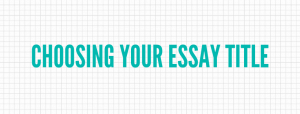
Choosing Your Essay Title
Before you can dive into structuring or writing your essay, you will need to spend time to decide on a topic you wish to write on. For the IB ToK Essay, you are required to compare and contrast different ways of knowing through perception, language, reason, emotion with different areas of knowledge (AOK).
1 – Selecting your prescribed title and knowledge question
Before you hastily decide on a title you wish to write, take some time to read each title carefully on the list and brainstorm ideas.
Tip #1: Brainstorming
Get some initial ideas you have of each and every title/ question down on paper. Ask yourself some simple questions when brainstorming for each title.
Am I confident to write an essay about this? Is the question asking what I am thinking? Do I understand the keywords or concepts in the title?
You may not be clear on what the title is asking you to do. Go through the title and highlight any keywords and concepts you are unsure about or may have missed out.
Do you have a strong interest in the title? We recommend that you should at least be interested since you will be spending time and effort on researching this topic, pick something you are willing to research more about!
Can you relate anything to the title? Though the IB Tok Essay should be as objective as possible, you can always inject the essay with personality and character.
You can always do so by adding in ideas or topics you have learned or studied in class or even personal experiences.
Tip #2: Understanding the question in your own words
The titles of these essay questions can sometimes be long and difficult to grasp when you first read them so before you write the IB ToK Essay, consider paraphrasing the question in your own words.
You may struggle to understand the keywords and concepts in the title, you may even be unsure about the perspective, comparison and contrast of the title.
To help our IB students, we recommend breaking down the question/ title by first, understanding the keywords in the title. Then, put the title together and understand what they are asking.
This way, you will be able to understand the title more in-depth than before and able to answer the title sufficiently.
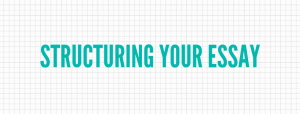
Structuring your Essay
1 – knowing the assessment criteria .
Overall Assessment
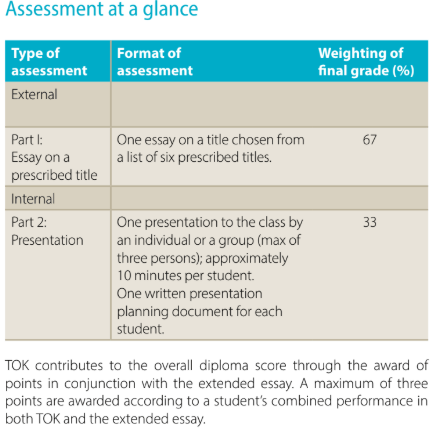
2 – Theory of Knowledge Essay
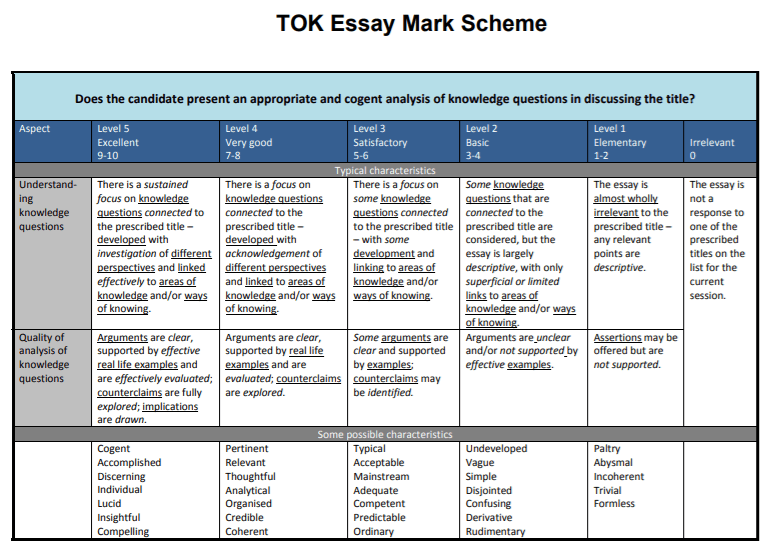
The rubrics require students to be able to understand the knowledge questions and their quality of analysis of knowledge questions. View the TOK Essay Mark Scheme here .
You will have to choose two Areas of Knowledge (AOK) to explore.
There are 8 different Areas of Knowledge are as follows:
1 – Mathematics
2 – Natural Sciences
3 – Humane Sciences
4 – History
5 – The arts
6 – Ethics
7 – Religious knowledge systems
8 – Indigenous knowledge systems
You can also use Ways of Knowledge (WOK) in your essay and they are as follows:
– Emotion
– Faith
– Sense Perception
– Reason
– Imagination
– Intuition
– Language
– Memory

Analysis of a Sample Essay
Question: “Doubt is the key to knowledge (Persian Proverb). To what extent is this true in two areas of knowledge?
Important Keywords in the Title
“To what extent”
When keywords like this appear, note that you need to present 2 different perspectives to the question, a for and against argument in your essay.

Paragraph 1: Introduction
You would provide an explanation and interpretation of the title and identify the key terms in the title. You would also need to state your thesis and explain or identify the areas of knowledge you will be exploring in your essay.
1 – Start the essay by saying something relatable or interesting
By doing that, you can capture the reader’s attention and make them want to read more by evoking a sense of curiosity to find out more about your essay.
2 – Your Thesis/ Stand
You can also state your thesis (that is different from mainstream ideas – to capture the reader’s attention). You can make the decision to be a for or against stand in your essay. If you decided

In your own words , give an interpretation of the title and show that you are able to identify the key terms of the question.
“The problem with doubt as the key to knowledge is that doubt isn’t a way of knowing. Doubt is an emotion we feel that motivates us to seek knowledge.”
3 – Outline of the paragraph
Give the readers an idea of what you will be going through in your body paragraphs , a sentence that gives the readers a preview. Let the readers know which AOKs you will be exploring, making it easier for the examiner to know what to look for.
“However this motivation can manifest itself differently in contrasting areas of knowledge like Mathematics and Religion.”
Your introduction should not be too long, use around 150 to 200 words for your first paragraph would be sufficient.

Paragraph 2: First Area of Knowledge.
1 – begin your paragraph with a claim or topic sentence.
This helps you to outline your argument about the title.
“Mathematics is an area of knowledge that is only concerned with reason.”
2 – Explain and Elaborate
Now, give explain and elaborate on your topic sentence/ claim.
“In a right-angled triangle a²+b²=c² and that’s it. There are no alternative answers or personal interpretations. An answer to a mathematical problem is either right or wrong. This is because the main way of knowing in math is reason and evidence is required for a mathematical statement to be true or false.”
3 – Give an example with an explanation
This helps you to further elaborate and explore your topic sentence or claim.
The example you give should be personal, specific, precise and real.
This way you can make your claim believable and relatable in some sense. This also helps to evoke a sense of authenticity in your essay.
“When we first learned about negative numbers in math class it made no sense to me. How could a bigger number have a lower value than a smaller one? It was illogical and it contradicted all the math I had learned before that day….. Either the previous mathematical information was wrong or the new information about negative numbers were wrong. But he explained the concept of a number line with a central point 0 and that they were both right.”
4 – Linking back
Remember to link back to your claim and the question after you are done exploring this example.
“My doubt led to understanding and was the key to my knowledge.”

Paragraph 3: Counter
1 – state your counterclaim.
This paragraph would focus on counterclaims . You are supposed to discuss 2 different perspectives to your claim, a for and against. You are to argue against your claim above this paragraph.
“On the other hand, doubt in mathematics can be detrimental to education.”
2 – Give an Example and Explanation
Add in an example and explanation to support your counterclaim.
“For example, after I do a question from the International Baccalaureate mathematics textbook I always look at the back in order to check if my answers are correct because it has answers in the back. If I do not have the book and I am in class then I ask my mathematics teacher for the correct answer. I do this when I am uncertain of my answer to a question and my doubt allows me to gain knowledge i.e. whether my answer is wrong or right. My doubt also helps me to assess how much of the mathematical concept I have understood by marking myself. However, this can be detrimental to progress because I started to become dependent on the answers at the back of the book or my mathematics teacher. Every time I do a question I feel like I have to verify my answer with an authoritative source which I have now come to understand leaves no room for exploration or the development of my own methods.”
3 – Linking back
Link back to your prescribed title and your claim of this paragraph.
“My doubt caused a loss of confidence in my mathematical abilities and dependence on authoritative sources.”
Now, follow this format and carry on writing for the next two body paragraphs, exploring on another Area of Knowledge, in this case, this student will have to write one more AOK on Religion and a counterclaim for it.
Aim to write a maximum of 600 words for each Area of Knowledge (Paragraph 2 and 3, Paragraph 4 and 5).
Paragraph 4: Second Area of Knowledge
– Topic Sentence
– Explain
– Example + Explanation
– Link
Paragraph 5: Counterclaim
- Topic Sentence (Counterclaim)
- Example + Explanation
- Link to prescribed title and your initial claim of this Area of Knowledge
Finally, write your ToK Essay conclusion in one paragraph totalling 200 to 250 words .

Paragraph 6: Your conclusion
Explain the different insights you have gained or have come out of this essay.
“As illustrated by the example of dependence on authoritative sources in mathematics doubt can be detrimental and cause a loss of confidence. Similarly, doubting conjectures has also proven to be unfruitful. However, within mathematics individual doubt can lead to the acquisition of knowledge.”
Implications and significance
Tell the readers why it is important to know that and how does it matter that they understand this when you write your IB ToK Essay.
Perspectives and Extension
If you can, try to input a very different perspective on your conclusion. Perhaps recognizing a different way of approaching the question, which could have resulted in different insights.
You can mention the limitations of your essay saying there are one or two unresolved questions that this essay has revealed. It’s about showing the readers that the conversation is not over yet. And that, there is more to the question and more rooms that you can explore.
“Furthermore, in areas like religion where we do not yet have the tools to prove it one way or the other simply doubting something by itself is a step towards acquiring knowledge because by suggesting that certain view is not absolute it makes room for new knowledge.”

A Quick Tip for writing a ToK Essay
Tip: try not to use dictionary definitions in your essay.
You want to show the examiners that you are writing a reflective essay, not a textbook definition heavy essay. Don’t rely too much on dictionary definitions to prove your argument or support a counterclaim. This will demonstrate that you did not engage with the topic and bypassed complexities around the topic.
Instead of using standard answers or cliche examples, you can try to use your own personal experiences to make it original and insightful for your readers. Though the essay should be objective, your essay should still have a personality and character.
Try Getting Expert’s Help
Tutopiya is a 1-1 Live Online Tutoring for all students aged 8 to 18 years old. Tutopiya offers the IB Diploma Programme curriculum to all students, visit our IB curriculum page to find out more about the subjects we teach here. We also have a blog full of useful IB resources for our students, why not read another sample essay for IB TOK ?
Interested to try our online learning with our expert IB tutors? We provide FREE 60 minutes trial lessons to all new students. You can sign up or simply fill up a trial form application here to begin learning with Tutopiya! Come learn how to write a ToK essay with Tutopiya today!
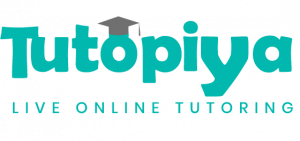
See author's posts
Recent Posts
- Empowering Minds: The Inspiring Journey of Fathima Safra Azmi
- Mastering IGCSE: Ace Your Exams in 3 Months with Our Unlimited Learning Program
- IGCSE Exam 2024 Revision: 10 Tips and Tricks to Score A*
- How to Ace Your IGCSE Exam in 3 Months: A Comprehensive Guide to Score A*
- Tutopiya’s Shining Star: An Insight into the Teaching Journey of Anshu Gupta
- IGCSE Group Classes in Singapore: Exam Preparation, Pricing, Benefits and Online Resources
- 1:1 IGCSE Online Tutoring in Malaysia: Benefits, Challenges, Online Resources and How to Succeed
- IGCSE Mock Assessment: Prepare with Tutopiya’s Practice Exams
- IGCSE Online Tutors Dubai: Boost Your Grades Now
- How to Stay Calm and Confident in IGCSE Exams
Get Started
Learner guide
Tutor guide
Curriculums
IGCSE Tuition
PSLE Tuition
SIngapore O Level Tuition
Singapore A Level Tuition
SAT Tuition
Math Tuition
Additional Math Tuition
English Tuition
English Literature Tuition
Science Tuition
Physics Tuition
Chemistry Tuition
Biology Tuition
Economics Tuition
Business Studies Tuition
French Tuition
Spanish Tuition
Chinese Tuition
Computer Science Tuition
Geography Tuition
History Tuition
TOK Tuition
Privacy policy
22 Changi Business Park Central 2, #02-08, Singapore, 486032
All rights reserved
©2022 tutopiya

IMAGES
VIDEO
COMMENTS
Table 1 V TOK Essay: ent ment Does the candidate ent an appropriate and cogent analysis of knowledge questions in ussing the title? t Level 5 Excellent 9 r10 Level 4 Very d 7 r8 Level 3 y 5 r6 Level 2 Basic 3 r4 Level 1 y 1 r2 Irrelevant 0 Typical acteristics nd r ing knowledge questions There is a ained focus on e questions d to
General information about the essay: Your TOK essay counts for most of the marks. It it is worth 67% of your final TOK grade. You will get the choice between a set of prescribed essay titles. These essay titles are all, in some way, related to the Areas of Knowledge. They will formulated as knowledge questions.
2. Understanding perspectives. Your TOK essay should show a clear awareness of different points of view, and should offer an evaluation of them. This means considering how different perspective might approach the question in different ways. 3. Offering an effective argument. The arguments within your TOK essay are clear and coherent, and are ...
Theory of knowledge (TOK) is assessed through an exhibition and a 1,600 word essay. It asks students to reflect on the nature of knowledge, and on how we know what we claim to know. TOK is part of the International Baccalaureate® (IB) Diploma Programme (DP) core, and is mandatory for all students. Learn more about theory of knowledge.
Discuss with reference to two areas of knowledge. TOK Essay B. High scoring IB Theory of Knowledge Essay examples. See what past students did and make your TOK Essay perfect by learning from examiner commented examples!
TOK is at its surface as simple as it sounds: you essentially learn the “what” and “why” of how we learn and understand knowledge. In order to assess students of their skills in TOK, IB uses an essay and a presentation. The essay makes up 67% of your total TOK score, making it the most important task to focus on for getting a high score.
The global impression judgment of the TOK essay is underpinned by a single question: This question shapes the reading and assessing of TOK essays. A mark out of 10 is then awarded using the assessment instrument. Does the student present an appropriate and cogent analysis of knowledge questions in discussing the title?
As of 2014, a student who scores an E on either the extended essay or TOK essay will not be eligible to receive an IB Diploma. Prior to the class of 2010, a Diploma candidate could receive a failing grade in either the Extended Essay or Theory of Knowledge and still be awarded a Diploma, but this is no longer true.
Theory of Knowledge is assessed, but not in the form of an exam. Instead, there are two parts of the assessment: an essay on a prescribed title and, new to this specification, the "TOK exhibition." The essay is marked externally and is worth 67% of the marks. The Exhibition is marked internally (but moderated externally) and worth 33% of the marks.
Tip #2: Understanding the question in your own words. The titles of these essay questions can sometimes be long and difficult to grasp when you first read them so before you write the IB ToK Essay, consider paraphrasing the question in your own words. You may struggle to understand the keywords and concepts in the title, you may even be unsure ...